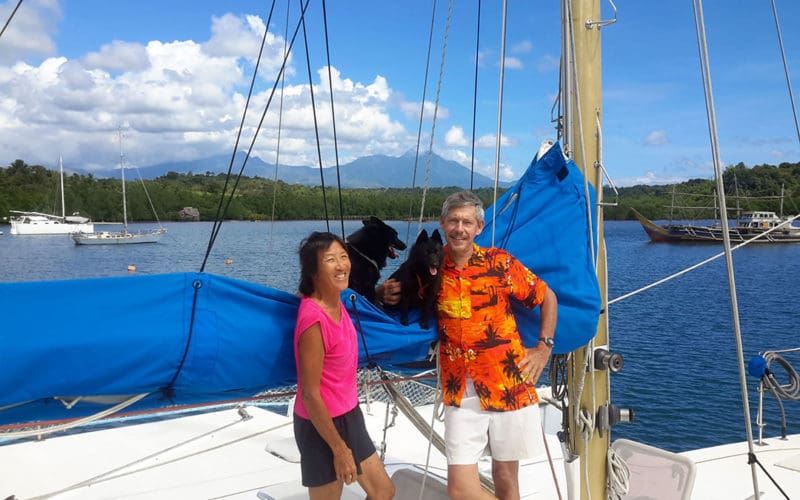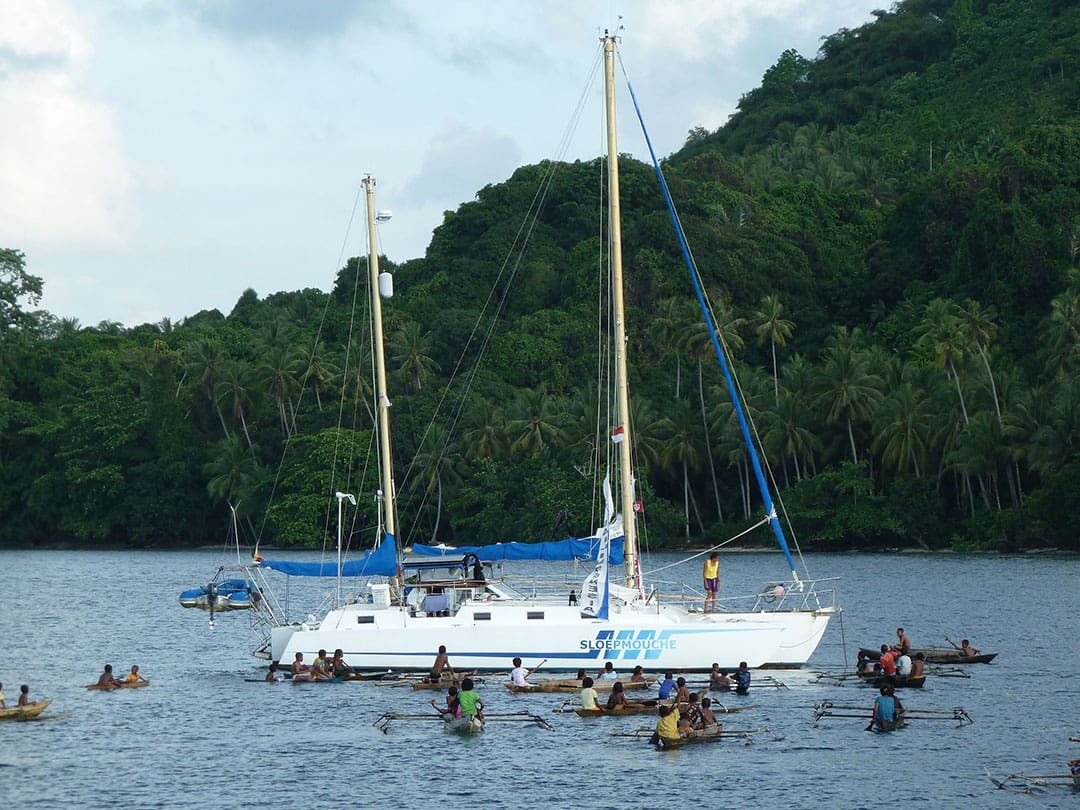
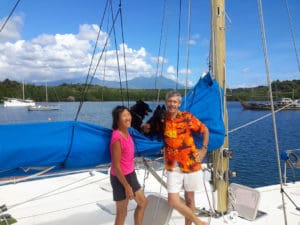
For Luc and Jackie Callebaut, voyaging on their trimaran Sloepmouche with their Schipperke dogs is a way of life. After working as a school teacher and scuba dive instructor in Belgium in the 1970s and early 80s, Luc Callebaut left for a new life when he joined Club Med as a Gentil Organisateur (GO) in 1984 in Guadeloupe. It was there he met Jackie, formerly a US Forest Service ranger, who was also enjoying a new life as a scuba instructor for Club Med. After eight years working as sport managers around the world, they decided that sailing around the globe was the best way to discover the tropics.
Getting experience working as boat captains for several years, they got their first vessel, a 28-foot Catfisher in the Caribbean. They bought their present boat, a wood/epoxy 46-ft Norman Cross trimaran Sloepmouche in 1995.
They spent eight years exploring the Caribbean, 12 years exploring the north and south Pacific and are now in their tenth year in Southeast Asia! Sailing with Schipperke dogs — from one to seven at the same time — has been quite fun and making money to support the sailing life has been quite diverse, enjoyable and interesting.
Their favorite areas are French Polynesia and Vanuatu where they spent four and five years respectively. They plan to return soon.
OV: What are the top skills voyagers need to know?
LC: One of those skills is seamanship, and too many people tend to forget the seamanship part. So, seamanship starts by training. You can take courses or you can read books. Then the best thing is learning seamanship by doing it, maybe other people’s boats. The ultimate way is learning by your own experience.
Basic computer skills are also important, because more and more you need to be able to use computers on board — a regular laptop or a computer for onboard communication. It’s more and more about computer skills, in order to send emails from the boat and to do calls with family and everything.
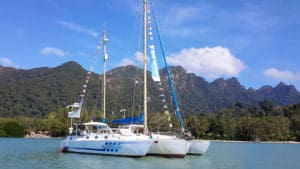
JC: Aside from your basic sailing and navigation skills, which are pretty obvious that people need to know before they voyage, I would say a big one is adaptability because you need to be able to adapt to crazy situations in a hurry without trying to hang on to plans or expectations. And the other thing that I think is quite important is “do it yourself” skills. Even if you are a voyager that has a lot of money, an expensive boat, and you can afford to hire people, sometimes you get in areas where there are no people to hire or the people that you hire are really like one-eyed man in the land of the blind. They don’t know too much. So, it’s best that you know your own systems and how to repair them, or at least you know enough that you can see if the workman is somebody who actually has the skills to be able to fix your boat.
OV: What is your planning routine prior to a voyage?
JC: Naturally, making sure you have enough fuel, water and provisions for the trip that you’ll be making. The next thing is to check the weather forecast as far ahead as possible. Most weather forecasting is pretty accurate now and can go out as far as a couple of weeks. Also it depends on whether you’re in an area where the weather can be forecast pretty well. In some of the convergence zones, it’s pretty difficult. Have a bad weather plan in case the forecasting is wrong.
LC: I research the destination in magazines, on noonsite.com and on Internet blogs. And I try to speak with cruisers that we meet along the way to get their impression about places where we plan to visit, because forewarned is fore armed. If you know more about the destination before you go there, you can avoid a lot of problems — for example, knowing what kind of official documents you need, what is the proper procedure to get in and all those kinds of things. Also, what are safe ports and what ports are not so safe weather wise. So, it’s nice to have a good idea of where you are going beforehand. But on the other hand, do not make too rigid plans because cruising is still going with the wind, the weather and the mood, as well as going to different that we hadn’t even thought about because some people tell you at the last minute about some place, or you make some discoveries, or you like a place much better than you think you could.
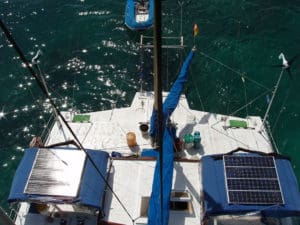
OV: What is the most valuable skill you have picked up while voyaging?
LC: I think the most valuable skill is to be flexible and adaptable, be able to change your plans at the last minute if there is a good reason and also to enjoy every day for whatever the day will bring, like discovering new places, new people, new cultures and basically learn new skills every day. Learn to fix electrical problems on board, motors, outboards. Learn about growing food, doing new sports and the excitement for new challenges.
JC: First I would say is adaptability, which is an all-encompassing skill in every different phase of sailing, willingness to let go of something you planned or wanted, and willingness to do something, listen to someone and maybe do something other than what you would normally do. Secondly, I would say, is some of the seamanship skills that I learned from an old salty sea dog. When we were younger, we worked on other people’s boats and we worked on a large motor vessel with a crusty captain and he showed us a bunch of skills. Mostly what you use is not your brawn, but you use your brain and you think out ways to do things without having to muscle it. Maybe using tools or using the force of the tide itself or the movement of the boat itself to help you out instead of working against you.
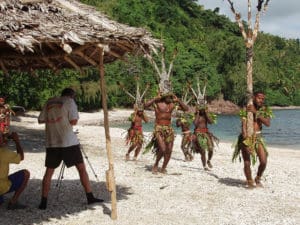
OV: Do you think the experience of voyaging has changed now that voyagers can stay more connected at sea?
JC: I would say overall, yes. And some of the positives, of course, are kind of obvious, that you can get weather forecasts as you go on long voyages and you can have security or you can contact people if you have a problem at sea. But I have also seen some negatives in this aspect and some other cruisers have mentioned this also. We have seen that there’s less face-to-face contact and talking with other cruisers, getting to know their knowledge and local knowledge, like instead of looking on the Internet to find out how to make the big passage from Tonga to New Zealand, just talk to the New Zealanders that have done it 13 or 14 times already and you’ll probably get a lot better information and you’ll get to know some friends. And I still believe in staying in contact by SSB radio. A lot of that is being replaced by satellite and by Internet communication. I think the SSB is still super important and can’t be replaced because you have the security nets where you have someone to talk to and check in with other people who keep contact with you, and you make some great friends with other boats.
LC: I think that definitively things change now that communication at sea is so constant and good today. I think that we have to be careful not to have a false sense of security. And I think more people, they may be not self-sufficient enough, might take a lot more risk than before because they believe that being in contact with a cell phone, they always will get help when they need it, not realizing that if they are far away at sea in a big storm, they can speak to whoever they want on the phone, but nobody is going to be able to magically appear and get them out of a tough situation. So, I think there is a certain danger there that maybe people don’t realize that even though modern communication is there, you have to still rely on yourself quite often.
OV: Does the pressure to stay on a schedule sometimes contribute to your taking risks with bad weather?
LC: Very rarely, because in our case if we do have a certain rendezvous, we plan to be near it weeks, if not months before. So, any reason like bad weather won’t put us in a bad place. And so we have the luxury to have enough time and no pressure to pick up the best weather window. But it doesn’t mean that you have to be paralyzed by the weather and you wait for the perfect weather. They may not happen for years.
JC: We are a different kind of voyagers. We are voyaging for a long time. We tell everyone we’re not making it around the world because our life isn’t long enough and the rest of the world is too interesting and too many places to stop and explore that we’re pretty much not going to make it all around. We don’t plan to get it done, check it off, finish our circumnavigation, put the boat up for sale, then get the RV and do something else. For us, voyaging is our life. Our schedules work around the boat, the weather and what’s great and what we’re enjoying at the time. If we like it, we stay. If we don’t, we go.
OV: What are the issues of voyaging with pets?
JC: Don’t go to Australia or New Zealand because it will be expensive and they’ll be quite exigent and nasty and make you jump through a lot of hoops. Everywhere else we traveled, it was easy. Only New Caledonia had a short, one-week quarantine in a facility. Otherwise, the dogs were able to stay on board or they had to stay on board at that island and couldn’t go ashore. Or after a certain period of onboard quarantine, then they could go onshore.
Just make sure that all the shots, the visits and everything are up to date and that they have a microchip. And a very important thing, I think, is to teach your pet to be able to do their little business on board. Either they have a certain place to go or like us, they have a little Astroturf carpet, which is their lawn, and that’s where they do their business. Otherwise, you could get very sick of having to get up early and go walking twice a day or go out during mosquito hours to get them to do their business. And if you’re going to do long distance voyaging, of course, the dog will be suffering not being able to go.
No matter what the issues, however, it’s always worth it to voyage with the pets. We started out with one schipperke dog and now we have three. And it’s such a joy to see what fun they have whenever you go ashore and you visit the natural areas or you show the tricks to the local kids and they all have such fun with the dogs.
LC: Other than the huge fun of having pets on board, if you have a dog, that dog may also be excellent to protect you from thievery or even to protect you from people with bad intentions, like abductors or terrorists.
We started with one by himself and then we got a couple and we love dogs so much that we end up breeding schipperkes. And we had four litters at different times. If you have a small boat, get a small dog. If you get a big boat, you can get a bigger dog or several small dogs like we did.
OV: What do you find most challenging about ocean voyaging?
LC: I think the biggest challenge is dealing with bureaucracy. The digital age is making it harder and harder to deal with increasing regulation and control, especially during this pandemic.
JC: I was thinking more of about being at sea. And we’ve been pretty blessed in our voyaging, and we must have a Guardian Angel over our heads. And because we’re never in a hurry or we don’t want to go in the high latitudes. So, we never had any really terrible problems or challenges during our voyages.
Our watchkeeping schedule is lucky for us because our different personal schedules. Luc cannot sleep during the day and I can sleep anywhere, anytime, any position. He goes and he takes a nice long night of sleep, and I do a long night watch and I do actually a split shift of sleeping. I sleep early in the evening and then early in the morning, and then he gets a nice big interval of sleep in the night time, and it works out really well for us. Our watchkeeping is great and we are always rested and on top of things.
OV: Who or what inspired you to go voyaging?
JC: That one is a very easy one for me. Back many, many, long years ago, maybe 35 years ago, we were working on a cruise ship in French Polynesia, and we met a couple named Scott and Gretchen who got permission to stay the cyclone season in Bora Bora. They took us on a day sail and showed us their way of life. And I just could not believe that you could bake chocolate chip cookies aboard a sailboat and that you could just live like a regular life. We kept in touch with them and many, many years later in American Samoa, we met them again and showed them how we were cruising and how they inspired us.
LC: I will go even earlier than that. I think what inspired me and probably Jackie, too, to go away from our home was scuba diving. We were both scuba instructors, and we took different jobs for Club Med and many exotic places. And we liked it so much that we decided to continue our voyaging not just to do scuba, but also to discover the world. The backpack kind of thing didn’t really appeal too much because you cannot carry much on your back. But when you’re sailing you can be self-sufficient.
OV: What are your future voyaging plans?
LC: We started cruising in the Caribbean, went through the whole South Pacific. Actually, it took us I think about 14 years to go through the South Pacific, and we spent the last six, seven years or more now in Southeast Asia. Presently we are planning to take several years to go via Indonesia to explore PNG and the Solomons, two places that we did not visit in the South Pacific yet. Then we will go back to Vanuatu, where we stayed five years and had a fantastic time. And from there, going back to all the islands that we enjoy all the way to French Polynesia, where we will probably swallow the anchor. By that time we’ll be pretty old. But swallowing the anchor doesn’t mean we are not going to live on board anymore and explore more of French Polynesia. ν

